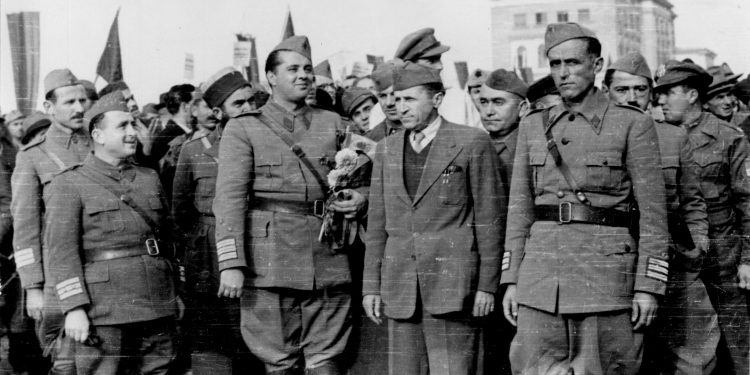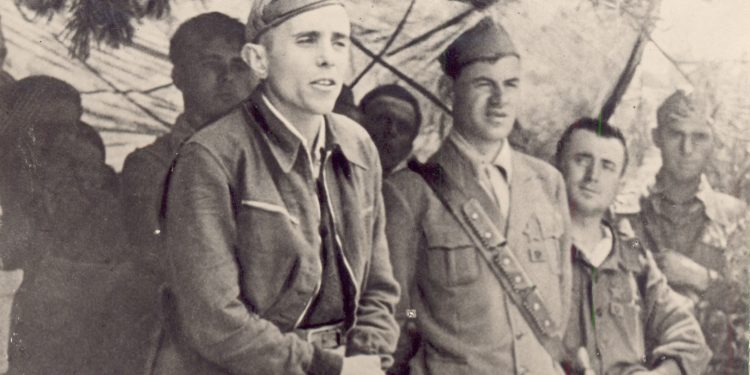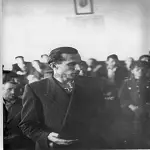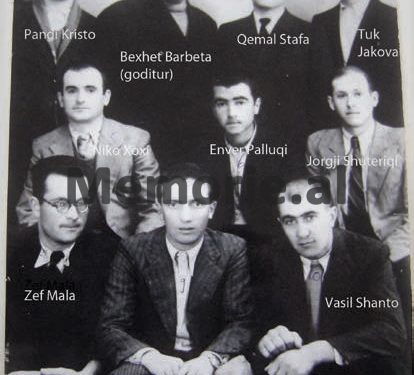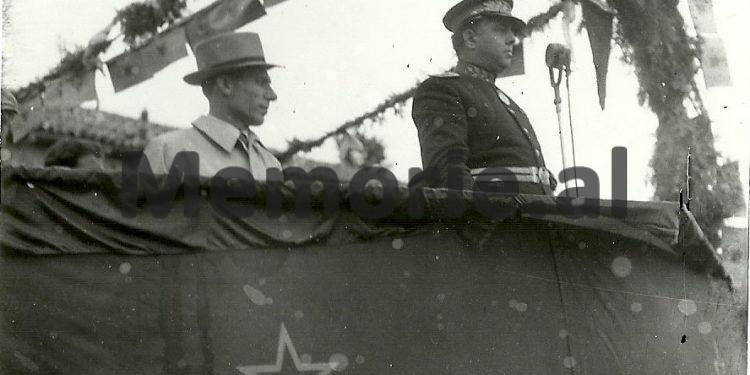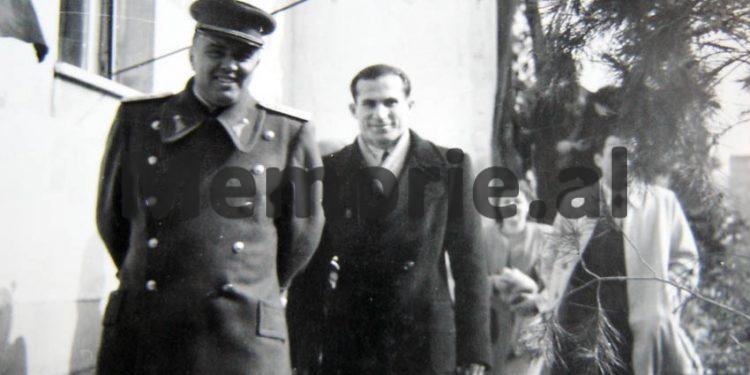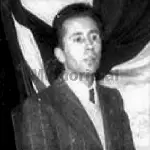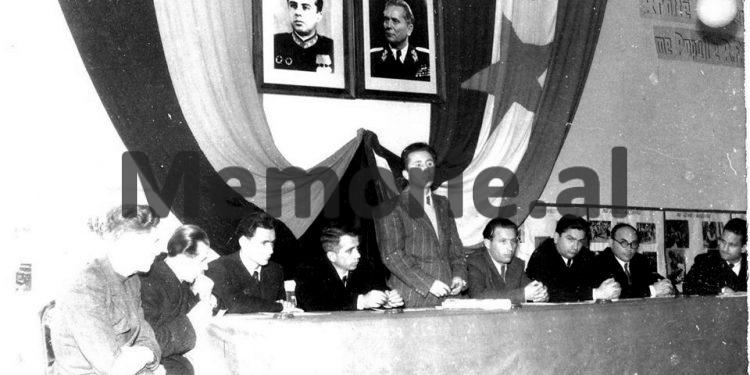Dashnor Kaloçi
The fourth part
Memorie.al publishes the rare and unknown story of Koçi Xoxe originally from Cologne, but born in 1911 in the village of Negovan in Florina, Greece, where their family had settled for economic reasons, who after studying and graduated with honors in the classical gymnasium of Thessaloniki in 1929, where he was introduced for the first time to the communist ideas and literature of the Marxist-Leninist groups operating in Greece at that time, returned to the city of Korça, later becoming one of the founders of the first cell communist in Albania and vice-president of the Communist Group of Korça, since the early 1930s, chairman of the Society ‘Puna’ in 1936, where in the elections held that year, the people of Korça elected him as chairman of the Municipality, but was not allowed by the government of King Zog, as he had been arrested and imprisoned several times for communist activities. Koçi Xoxe’s participation in the founding meeting of the Communist Party of Albania in November ’41, (where he went a day late, because he was busy organizing the demonstration on November 7 of that year in the city of Korça where he remained killed the young communist, Koci Bako), where for his great contribution to the communist movement, he was elected in absentia, as a member of the Provisional Central Committee, and later as a member of the General Staff of the National Liberation Army since July 10, 1942 at the Labinot meeting, the delegate to the Përmet Congress on May 24, 1944, where he was awarded the rank of lieutenant general, and at the Berat meeting in October of that year, he was elected deputy prime minister headed by Enver Hoxha. Xoxa’s brilliant career immediately after the end of the War, climbing the ranks of the party and state hierarchy, as organizational secretary of the Albanian Communist Party, member of the General Presidency of the Democratic Front of Albania, member of the People’s Assembly, Minister of Internal Affairs and Deputy Prime Minister of the ‘democratic government’, being the number two figure of communist Albania, after Colonel-General Enver Hoxha. Unknown photos and rare testimonies of his two sons, Genc and Fatos, who for the first time shed light on the unknown history of their family and father, Koçi Xoxe, his relationship and relations with Enver, as well as the reasons the truth of his beating and physical elimination, as well as their tragic fate after 1949, when he was shot somewhere in a forest on the outskirts of Tirana (where the former Kinostudio “Shqipëria e Re” is located), where today his bones!
Continued from the previous issue
Enver’s trick after the arrest of Koçi Xoxa!
After the dismissal of Koçi Xoxe from the post of Minister of Internal Affairs, in his place Enver projected Major General Mehmet Shehu, who immediately after taking office, put in the key posts of that ministry, his most loyal people and the Directorate of State Security was taken over by Soviet advisers (Colonel Sokolov and Voleskini), who controlled almost everything in the Interior Ministry. Seeing the strong positions of his subordinate or rival Koçi Xoxe, Enver initially did not see fit to immediately dismiss him from all posts and make his arrest, because in the Ministry of Interior, there were still all the people trusted and loyal to Xoxes. According to the testimonies of some senior military men who served in the Ministry of Interior and the Ministry of Defense at that time, Enver Hoxha, in order to avoid any incident or military coup by Koçi supporters, did not arrest him immediately after his dismissal as Minister of Interior. Although Enver had planned the end of his rival, he used a subtle trick to “dampen” any reaction of Xoxa supporters in the ranks of the Interior Ministry. Thus, after the dismissal of Xoxa, Enver immediately appointed in his place the post of Minister of Interior, Colonel Nesti Kerenxhin, one of the most loyal people of Koçi. With that, he seemed to be saying to Xoxa’s people that: and the most loyal man of Koçi and yours”. Enver’s scheme worked as he had hoped, and in the ranks of the colonels and other senior military men who held key positions in that ministry, there were no major reactions. Less than a few days after Koçi’s appointment as Minister of Industry, on October 31, 1948, he was removed from all official functions, party and state, and on November 22, by a unanimous decision of the Congress, he was also expelled from the party. After that, Enver Hoxha ordered the immediate arrest of him and Pandi Kristos, Xoxa’s closest collaborator. Following these, a large number of senior military officers who had been Koçi Xoxa’s closest associates were arrested, such as Nesti Kerenxhi, Vaskë Koleci and Myftar Tare, who had held the posts of Deputy Ministers of Interior, as well as many followers of others of them.
Wife Sofika: This is how Koçi was arrested!
Regarding the arrest of Koçi Xoxa, his wife Sofika, shortly before he passed away, when he was close to 90, testified: “On the day of Koçi’s arrest, my children and I experienced it with a lot of pain, but without being alarmed because I was accustomed to his numerous arrests and imprisonments, since the time of the War. I remember as now that day of November 28, 1948, when Koçi after talking on the phone with Bedri Spahiu, who had asked him to go with a service somewhere. At that time, Koçi’s car arrived in front of our house with the driver and an escort. Koçi left and left only for Bedri Spahiu, unaccompanied by anyone. Then they called us from the Ministry of Interior and asked us for his clothes. After that we realized that he had been arrested and we waited anxiously for what would happen to him. My anxiety for Koçi had started before the First Congress of the SNP, when the attacks on him in the plenums and other assets of the Party began. Initially, Koçi was sent to isolation in the barracks of the ‘Palace of Brigades’, where there was an old house from the time of Zog that does not know why it functioned. He was then sent to the ‘Old Prison’ of Tirana, (prison at “Mine Peza”, where he was kept under strict security measures surrounded by many police and soldiers. After a month we went to meet my father-in-law (father of Koçi, Dhimitr), my sister, and grown children. It must have been the end of May when we went to meet him and we were all in the family, with my sister and Koçi’s father. To Genc, saying: Do not keep your head down. You should not be ashamed that I am here in prison. I have fought and worked for 20 years for Albania, and now for these two years, they are telling me that I was wrong! But here I am telling everyone, I have done nothing with my head, of those who accuse me of these. I have only acted on the basis ë of the decisions of the Political Bureau and the Commander, Enver Hoxha. I am innocent and they are accusing me of unfair political reasons. While Koçi was saying these words to us, Colonel Halim Xheloja (later General and Deputy Minister of Internal Affairs) intervened, who was present at our meeting. He told us to talk only about family problems and not to talk about other things. Meanwhile, Koçi said: No, and my family should know the truth, that I have not done anything wrong. Likewise in that meeting, I remember that he told the children to listen to mom and grandpa for the time he was not at home and daughter Lyric, so that she would not leave the piano lesson, but continue it with Jorigjina (Truja). We last met Koçi at the end of May 1948, shortly before he was shot. He was greatly weakened by the tortures they had inflicted on him and we barely know him. He was wearing pajamas and again ordered us what he had told us at the first meeting, that he was innocent and stood by none of those accusations made against him. He addressed his father, Demetrius: Father, you know well your duties. Please do not address anyone to me. To be convinced that I am innocent and one day history will have its say. Tell this to Sofika and the children, so that they too may know this. Have faith that one day the truth will come out. I am innocent. After that we did not meet him again. As we later learned, he was shot on the night of July 10, 1949, in a secret place that we have not been able to find out to this day. “At least he should have a grave like everyone else,” recalled Sofika, Xoxa’s wife, regarding the last meeting and the wills left to her by her husband, Koçi, shortly before he was shot.
Enver in Moscow for the Xoxes trial
The fall and punishment of Koçi Xoxa, official Moscow did not leave simply as the punishment of an opponent of Enver Hoxha. According to Hungarian dissident Georges Herman Hodos, who has dealt extensively with the Xoxe affair, Stalin and Berian ordered that Xoxe should not only disappear physically, but that he should set an example, as a leader of the Yugoslav orientation, and be unmasked as a criminal, traitor and ordinary tool of imperialism. But most important and foremost according to analyst Hodos, for the Soviets in that matter, the main defendant should have emerged not Xoxe, but Josif Broz Tito. In the “new role” that the Soviets had assigned to Xoxes, he had to tear the mask off his Yugoslav master, Marshal Tito, by portraying him as the main agent of the Western intelligence services. For this, the Soviet advisers worked and solved the task assigned to them, as much as could be done in those circumstances. Thus, Xoxe and his group were tortured day and night, since the end of November 1948 when they were arrested. In March 1949, the Ministry of Internal Affairs was finally able to inform Stalin that the first incriminating protocols had been signed. At that time, at the end of March of that year, Enver Hoxha was summoned to Moscow to receive relevant instructions about the trial of Xoxa and his group that was preparing to be staged. The trial against Koçi Xoxe and the so-called “his gang” accused of being “agents, saboteurs and collaborators of the Yugoslavs” took place behind closed doors, beginning on May 12, 1949. In the indictment, they were accused of organizing a plot to overthrow the Albanian government in cooperation with Tito and that they had planned to assassinate the party leaders, aiming to unite Albania, the Federal Republic of Yugoslavia. Also in that indictment, it was said that that group acted in charge of the Western imperialist services, to create with the Balkan states, an anti-Soviet bloc. Xoxe was accused of having placed in key positions of the Party, participants in the conspiracy, with the help of Pandi Christos, head of the Central Control Commission, that he had charged Vango Mitrojorgji, his security chief, to arrest elements hostile to Tito, under the leadership of the Party, that the tasks he had given to Nesti Kerenxh, the Head of the State Planning Office, were to sabotage the Albanian economy and integrate it into the Yugoslav economy. After that, on July 8, 1949, the press announced with short news the decision of the People’s Court, that Xoxe was sentenced to death, and Pandi Kristo, to twenty years of forced labor. Long-term prison sentences were handed down against Kerenxhit, Mitrojorgji, Deputy Interior Minister Vaskë Kolec and the head of the Central Propaganda Section Nuri Huta. Two days later, on July 10, 1949, Koçi Xoxa was executed. This process was followed by other trials in which he was imprisoned, shot, or interned, along with dozens of others accused of being “Kochixoxists and Titoists.” Memorie.al
The next issue follows




